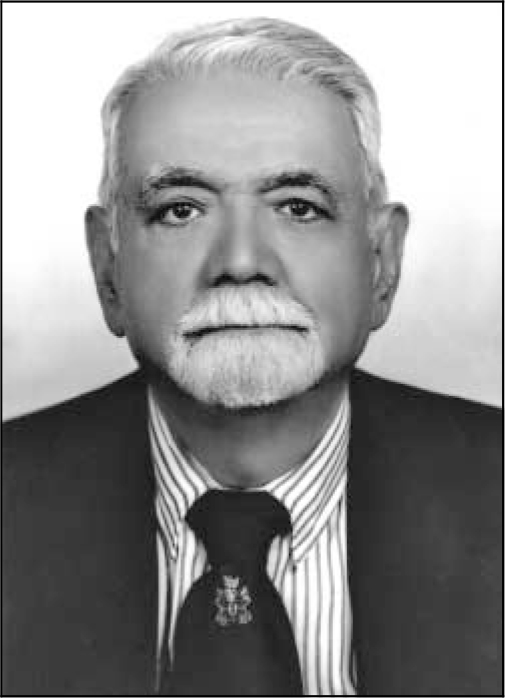
Formerly President of the Iranian Psychiatric Association
Aslan Zarrabi, born in Kashan, Iran, on 28 June 1928, was the first Iranian who was elected as a Fellow of the Royal College of Psychiatrists. He introduced the British school of psychiatry in Iran. He passed away in Tehran on 21 February 2012.
From an early age, Aslan demonstrated exceptional intellectual ability. He managed to pass his 2-year primary school examinations in 12 months and entered university a year ahead of his peers. At the University of Tehran, he obtained a degree in criminology in 1951 before qualifying as a medical doctor in 1952. Soon after, in 1953, he was imprisoned for 4 years for opposing the Anglo-American coup which toppled the government of the democratically elected Iranian Prime Minister Mohammad Mossadegh. When asked how he looked upon this period, he would reply with a smile: ‘I read a lot of books’.
After his release from prison, he worked as a general practitioner for 3 years and in 1960 moved to England to study psychiatry. His first training post was at the Maudsley Hospital. He then gained a scholarship from the World Health Organization and continued his studies at the Derby Psychiatric Hospital. Later he received training at St Christine Hospital before returning to London to take up a training post in the Department of Child Psychiatry at Bethlem Royal Hospital. He also worked in neuropsychiatry posts at the National Hospital for Neurology and Neurosurgery and Maida Vale Hospital, London. In 1963, he became a member of the Royal Medico-Psychological Association and received his Diploma in Psychological Medicine in 1965.
Armed with knowledge and qualifications, Aslan returned to Iran. He was initially warmly invited to take up a post at Tehran University, but ‘the powers that be’ never forgot the matter of his political past. The Shah's secret service intervened and stopped his recruitment on the basis of his political views. Undaunted by this setback and still full of hope, Aslan started work in a private psychiatric hospital with the help of a few friends who shared his views and his vision.
In the 1960s, psychiatry in Iran was dominated by psychoanalysts and those with more philosophically based views of mental illness. Aslan again proved that he could plough his own furrow and come out bearing fruit. He introduced the meticulous practical and medical approach to psychiatry which he had learned in the UK; soon, he was attracting the attention of many trainees and colleagues who would come to his ward rounds and clinics to learn. He was invited to give lectures across the country, and became so popular and respected among the community that the ban on his employment was removed and he was appointed Chief of Psychiatry Service in Ozgol Psychiatric Hospital, Tehran. Subsequently, he was called upon to take up the post of CEO at Razi Psychiatric Hospital, now the largest psychiatric hospital in the Middle East with over 1500 beds. During his 3-year stay at the hospital, Aslan paid particular attention to the quality of patient care as well as opening general medical and surgical wards to attend to non-psychiatric needs of the patients. Aslan's career progressed further when he was appointed Chief of Mental Health Service in the Tehran Metropolitan Region, and later Chief of National Mental Health Services by the Iranian Ministry of Health. In 1977, he became Fellow of the Royal College of Psychiatrists.
With the victory of the Iranian Revolution in 1978, he was elected as the first President of the Iranian Psychiatric Association. He served the Association for many years and made a substantial contribution to the Iranian National Mental Health Committee and the Addiction Committee in the Ministry of Health. During his career, he spent considerable time travelling all over the world visiting psychiatric institutions and attended numerous conferences to further transfer knowledge to younger generations in Iran. He taught countless numbers of students and trained many doctors at the Tehran Institute of Psychiatry, the University of Rehabilitation and Welfare and the University of Tabriz.
Aslan was extraordinary. He was a charismatic man with broad shoulders, fair complexion, a strong voice, and clear opinion, yet he never came across intimidating or patronising. He would engage in a wide range of issues in different domains of political, cultural, scientific and historical subjects and also literature. He could maintain an interesting and informative discussion for hours without looking tired. He was an avid reader and had encyclopaedic knowledge. Often, he drew from his own experience as he had travelled extensively across the globe. Aslan used to say only what he believed in, yet those whom he praised and those whom he criticised admired him alike. He was an optimist, he had no regrets and enjoyed life fully until the very last moments. He spoke French and English fluently and had psychiatric qualifications from both countries. Although he slightly preferred French to English as his second language, he was proud of his British training and his association with the Royal College of Psychiatrists.
He leaves two well-educated daughters, Shirin and Shayeste, who now live in California.



eLetters
No eLetters have been published for this article.